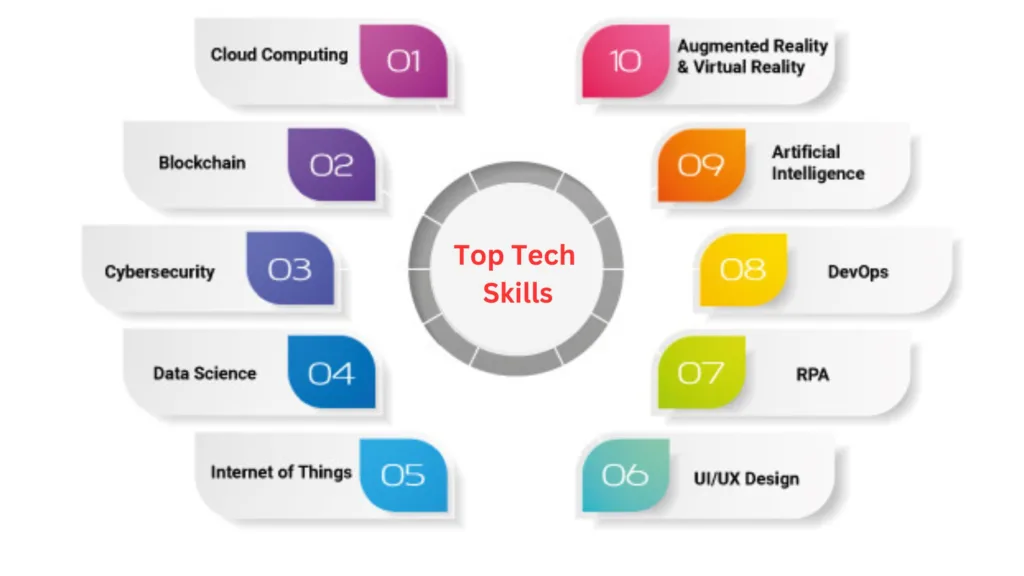Last Updated on November 6, 2023 by GREENLEARNERS
Introduction
Are you looking for high-paying technology skills to learn that will still be relevant and make you a lot of money in the future?
If yes, then you’re in the right place!
In today’s rapidly evolving technology-driven world, acquiring high-paying technology skills has become increasingly important.
The technology industry itself is constantly changing, with new advancements and innovations emerging regularly.
As a tech professional, it is crucial to stay relevant and adapt to these changes to ensure long-term career growth, profitability, and stability.
According to a report by the Bureau of Labor Statistics, the demand for tech workers is expected to grow by 13 percent through 2030 which is much faster than the average for all occupations.
This means that there will be plenty of opportunities for skilled tech workers in the years to come.
In this article on GREENLEARNERS TECHNOLOGIES, we will discuss the top 15 high-paying technology skills that will still be relevant even after 20 years and how you can begin your journey learning any of these skills.
Also, we will show you what each skill entails as well as the salary range of these technology skills. We equally added some bonuses at the end of this article.
What are you waiting for?
Let’s dive into the topic!
What are Technology Skills?

Technology skills are the ability to use technology to solve human problems, create new things, and communicate effectively.
According to COURSERA, technology skills are all the abilities that help you interact with the digital world around you.
Being technologically skilled refers to proficiency in digital or technical media.
So, technology skills cover a wide range of abilities that allow people to work effectively with and make use of different types of technology to accomplish particular goals and objectives.
These abilities include being able to use digital hardware, software, and tools as well as understanding and adjusting to technological advancements.
RELATED: 25 Reasons Why You Need A Tech Career Today!
The Two Main Categories of Technology Skills.

Technology skills can be broadly categorized or divided into hard skills and soft skills.
Hard Technology skills
Hard skills are technical skills, or abilities that are specific to a particular technology, tool, or platform.
For example, hard skills might include programming languages like Python, database management, network administration, cloud computing, software development, developing mobile apps in Swift, or managing cloud infrastructure in AWS.
Other examples of hard technology skills include;
- Data analysis:
Data analysis involves the ability to collect, organize, and analyze data that is essential for making informed decisions in any field.
Information security: Information security is the practice of protecting systems and data from unauthorized access, use, disclosure, disruption, modification, or destruction. Information security professionals are in high demand and can command high salaries.
- DevOps:
DevOps is the practice of bringing together development, operations, and security teams to shorten the development cycle and improve the quality of software.
- Agile development:
Agile development is a methodology for software development that emphasizes iterative development, continuous testing, and customer collaboration.
- User experience (UX) design:
UX design or User Experience Design has to do with the process of designing user interfaces that are easy to use, navigate, and enjoy.
- User interface (UI) design:
In UI design, the visual elements of user interfaces, such as buttons, menus, and icons are created.
UI designers are also in high demand because businesses are increasingly focused on creating visually appealing interfaces.
- Robotics:
Robotics is the field of engineering that deals with the design, construction, operation, and application of robots across various industries.
- Artificial intelligence (AI):
AI is a rapidly growing field in technology that is transforming many industries.
Artificial intelligence (AI) is the simulation of human-like intelligence in computers that enables them to carry out operations that ordinarily call for human intelligence.
AI is the process of developing algorithms, models, and systems that give computers the ability to evaluate data, spot patterns, make decisions, and resolve issues in a manner that is similar to how humans think.
- Machine learning:
Machine Learning is a subset of Artificial Intelligence (AI) that empowers computers to learn from data and experiences without being explicitly programmed for each task.
Machine learning techniques allow computers to spot patterns, make predictions, and enhance their performance over time by analyzing and learning from examples rather than depending on conventional rule-based programming.
Soft Technology skills
Soft skills, on the other hand, are non-technical skills that are essential for success in any field, including technology.
These skills involve interpersonal, communication, problem-solving, critical thinking, teamwork, and adaptability.
In the technology context, soft skills are often vital for effective collaboration, project management, and customer interaction.
So, a well-rounded technology professional’s skill set must include both hard and soft abilities because both are essential to job success and the capacity to contribute to teams and projects.
Success in a profession in technology requires both hard and soft talents.
Hard skills can help you find a job, but soft skills will enable you to progress professionally and contribute significantly to your team.
In this article on Greenlearners Technologies, we’re majorly focusing on hard technology skills.
Why focus on technology skills that stand the test of time?

Learning technology skills that stand the test of time is very important due to the dynamic and rapidly changing nature of the tech industry.
In an era of constant innovation and technological advancements, some skills have proven their relevance and resilience by remaining useful and applicable even as new technologies emerge.
People can future-proof their jobs and ensure they remain valued assets in a workplace where obsolescence is a continual concern by focusing on these enduring skills or abilities.
Moreover, as industries across the board continue to integrate technology into their operations, professionals with skills that transcend trends can navigate various sectors, unlocking diverse opportunities and enjoying sustained career growth.
So, here are some reasons why you may need to focus on technology skills that will still be relevant in the future as curated by Greenlearners Technologies.
- Rapid technological advancements
The pace of technological advancements shows no signs of slowing down.
With each passing year, we witness groundbreaking inventions and developments that reshape industries and revolutionize the way we live and work.
By focusing on technology skills that withstand the test of time, professionals can future-proof their careers and remain relevant as well as at the forefront of the ever-evolving tech landscape.
- Ensuring long-term career growth and stability
High-paying technology skills provide the foundation for long-term career growth and stability if invested in properly.
As technology continues to permeate various sectors, the demand for skilled professionals in these fields will only increase.
People can secure lucrative opportunities in tech and build a solid career foundation that extends well into the future by honing their expertise in areas that are poised to remain relevant.
- Gaining a competitive edge
In today’s competitive job market, having the right technology skills can give you a significant edge over other candidates.
By focusing on skills that are in high demand and that are likely to remain relevant for the foreseeable future, you can make yourself more marketable to employers and increase your chances of landing a high-paying job.
- Staying ahead of the curve
The tech industry is constantly evolving, so it is important to stay ahead of the curve by keeping your skills up-to-date.
If you focus on technology skills that stand the test of time, you can ensure that you are always in demand and that your skills are relevant to the latest trends.
The Role of High-Paying Technology Skills in Transforming Industries

Technology has become an integral part of every industry, shaping the way businesses operate and revolutionizing traditional practices year in, and year out.
The convergence of technology with various sectors has created a need for skilled professionals who can leverage high-paying technology skills to drive innovation and bring about transformative change.
According to a study by the World Economic Forum, which surveyed 3,000 business leaders from 125 countries, it is true that 84% of business executives cited technology as a key transformation agent.
This study found that technology is seen as a major driver of innovation, productivity, and growth.
Again, high-paying technology skills are essential for promoting innovation in various industries.
Another report by McKinsey Global Institute confirmed that businesses that adopt cutting-edge technologies can see a 10% boost in productivity.
This is because new technologies can help businesses to automate tasks, improve decision-making, and create new products and services.
For example, data scientists can use AI and machine learning to extract insights from data, which can be used to improve decision-making, optimize operations, and develop new products and services.
In the same vein, Cybersecurity professionals can protect computer systems and networks from cyberattacks, which can help businesses avoid costly data breaches and downtime.
Also, Cloud computing professionals can help businesses adopt cloud computing solutions, which can save businesses money and improve efficiency.
It was also reported that the global datasphere is anticipated to reach 175 zettabytes by 2025 necessitating the use of high-paying technical skills that enable data-driven decision-making.
This is because data is becoming increasingly valuable, and businesses need to be able to make sense of it in order to make informed decisions.
Lastly, one of the after-effects of the COVID-19 pandemic, which 80% of CEOs acknowledge is the acceleration of digital transformation and inclusivity.
This highlights how important technology skills are, showing how they can help businesses become even tougher and better able to handle challenges.
Overview Of Industries Being Shaped By Technology
From finance and healthcare to manufacturing and entertainment, technology is revolutionizing every sector.
It has given birth to fintech companies, telemedicine practices, advanced manufacturing processes, and immersive virtual experiences, among many other advancements.
By embracing high-paying technology skills, professionals can make significant contributions to shaping the future of these industries.
Also Read: How To Build Any Type Of Website Without Writing A Single Line Of Code!
Top 15 High-Paying Technology Skills That Will Still Be Relevant Even after 20 Years.
Here are the top 15 high-paying technology skills that will still be relevant even after 20 years.
Artificial Intelligence (AI)

Artificial Intelligence (AI) has emerged as a transformative technology with the potential to disrupt industries across the globe.
With advancements in machine learning and deep learning, AI is set to continue its relevance even after 20 years.
From autonomous vehicles and virtual assistants to personalized marketing and medical diagnoses, AI will play a crucial role in shaping the future.
Emerging applications and career prospects in AI
The field of AI is expanding rapidly, with new applications being discovered regularly.
Professionals with high-paying AI skills can explore opportunities in various fields, including healthcare, finance, retail, agriculture, manufacturing, and so on.
As curated by Greenlearners Technologies, Careers in AI include;
- AI researchers,
- Algorithm developers,
- AI consultants,
- AI ethics specialists,
- Machine learning engineers,
- Data scientists,
- Natural language processing engineers,
- Computer vision engineers,
- Robotics engineers, and
- AI product managers,
These technology skills encompass roles that drive innovation, development, and ethical implementation of artificial intelligence technologies.
These professionals work across diverse industries to create intelligent systems, analyze data, improve automation, and ensure responsible AI integration.
Salary Range of professionals with AI technology skills
The Salary Range of professionals with AI technology skills spans from $85,000 to $225,000 per year.
The average salary for AI professionals in the United States is $132,012 per year.
Data Science and Analytics

In this data-driven era, the ability to extract actionable insights from vast amounts of data has become paramount.
Data science and analytics play a vital role in helping businesses make informed decisions, optimize operations, and identify trends and patterns.
To stay competitive, businesses need professionals with these high-paying skills to derive meaningful insights from data.
Skills required for success in the field of Data Science and Analytics
Professionals in data science and analytics must possess a strong foundation in statistics and mathematics.
They should also have expertise in programming languages like Python and R, along with proficiency in data visualization and machine learning techniques.
By continuously updating their skill sets, data scientists can unlock high-paying opportunities in diverse industries.
Salary Range of professionals with Data Science and Analytics technology skills
The Salary Range of professionals with Data Science and Analytics technology skills spans from $65,000 to $185,000 per year.
However, according to a report by Indeed, the average salary for data science and analytics professionals is $124,493 per year.
Cybersecurity

With the rise in cyber threats and data breaches, the demand for cybersecurity professionals is skyrocketing every single day.
Companies need skilled individuals who can protect their systems, networks, and data from malicious attacks.
As technology evolves, cybersecurity will remain a critical concern, making it an excellent high-paying skill to invest in both now and in the future.
Critical skills needed to combat emerging threats
Professionals in cybersecurity must possess a strong knowledge of network security, cryptography, and ethical hacking.
Also, they need to stay updated on the latest cyber threats and security measures.
Additionally, expertise in risk management, incident response, and compliance is essential.
By continuously upskilling and adapting to emerging threats, cybersecurity professionals can ensure their skills remain highly valued.
Salary Range of professionals with cybersecurity technology skills
The Salary Range of professionals with cybersecurity technology skills spans from $85,000 to $300,000 per year.
However, according to a report by Cyberseek, the average salary for cybersecurity professionals in the United States is $116,330 per year as of 2023.
Cloud Computing

According to IBM, Cloud computing is on-demand access, via the internet, to computing resources—applications, servers (physical servers and virtual servers), data storage, development tools, networking capabilities, and more—hosted at a remote data center managed by a cloud services provider (or CSP).
Cloud computing has revolutionized how businesses store, access, and manage data and applications.
Its flexibility, scalability, and cost-effectiveness make it indispensable across various industries.
As more organizations migrate to the cloud, the demand for professionals with expertise in cloud computing will continue to grow.
High-paying roles and skills in cloud computing
Professionals with high-paying skills in cloud computing can pursue diverse career paths, including;
- Cloud architect,
- Cloud Security Specialist,
- Cloud Sales and Solution Architect,
- Cloud Data Engineer,
- Cloud engineer, and
- Cloud consultant.
They should have a deep understanding of cloud platforms like Amazon Web Services (AWS), Microsoft Azure, and Google Cloud as curated by Greenlearners Technologies.
Expertise in areas like virtualization, containerization, and cloud security is crucial to excel in this field.
Salary Range of professionals with Cloud computing technology skills
The Salary Range of professionals with Cloud computing technology skills spans from $85,000 to $260,000 per year.
Software Engineering

According to Michigan Technological University, Software engineering is the branch of computer science that deals with the design, development, testing, and maintenance of software applications.
Software engineers apply engineering principles and knowledge of programming languages to build software solutions for end users.
Software engineering serves as the backbone of technological advancements and it involves the design, development, and maintenance of software systems, ensuring they meet the evolving needs of businesses and users.
As technology continues to evolve, the demand for software engineers with high-paying skills will continue to increase.
Essential technology skills for software engineers in the future
Software engineers should possess strong programming skills in languages such as Java, Python, JavaScript, or C++.
They should also be adept at software development methodologies, such as Agile or DevOps.
Also, an understanding of cloud computing, cybersecurity, and AI will further enhance their marketability in the long run.
Salary Range of professionals with Software engineering technology skills
The Salary Range of professionals with Software engineering technology skills spans from $105,000 to $300,000 per year.
The average salary for Software engineering professionals in the United States is $139,722 per year in the United States according to GlassDoor.
RELATED: All you need to know about Greenlearners Technologies!
Blockchain

A Blockchain is a decentralized ledger that consists of continuously expanding lists of entries (blocks) that are safely connected to one another by cryptographic hashes.
The transaction data is typically shown as a Merkle tree, with the leaves representing the data nodes, and each block also includes a date and a cryptographic hash of the previous block.
A chain is effectively formed by the blocks since each one links to the blocks before it because each block includes information about the blocks before it.
Therefore, once a transaction is recorded, it cannot be undone without also undoing all subsequent blocks, making blockchain transactions irreversible.
While blockchain technology gained prominence with cryptocurrencies like Bitcoin, its potential extends far beyond digital currencies.
Blockchain offers secure and transparent solutions for various industries, including supply chain management, finance, and healthcare.
Professionals skilled in blockchain technology can explore a wide range of high-paying career opportunities as well.
Promising career opportunities in blockchain technology
Blockchain professionals can pursue roles as Blockchain Developers, Blockchain Sales Engineers, Blockchain Security Engineers, Blockchain Consultants, Blockchain Architects, or Blockchain analysts.
They should have a deep understanding of blockchain fundamentals, cryptographic principles, and smart contract development.
By staying updated on the latest blockchain trends and regulations, these professionals can carve out lucrative career paths that will be relevant in years to come.
Salary Range of professionals with Blockchain technology skills
The Salary Range for professionals with Blockchain technology skills spans from $85,000 to $260,000 per year.
According to a report by Indeed, the average salary for blockchain professionals in the United States is $140,592 per year as of 2023
Internet of Things (IoT)

The Internet of Things (IoT) has transformed the way devices and systems interact, revolutionizing industries like healthcare, manufacturing, and transportation.
The ability to connect and collect data from numerous objects opens up a world of possibilities. Professionals skilled in IoT can help shape the future by leveraging this technology.
Crucial technology skills for IoT professionals
Professionals in IoT should possess a strong understanding of wireless communication protocols, data analytics, and sensor technologies.
They should also be proficient in cloud computing and cybersecurity for effective IoT implementation.
Also, they need to stay up to date on emerging IoT trends and advancements to remain relevant in this field.
Salary Range of professionals with IoT technology skills
The Salary Range of professionals with IoT technology skills spans from $85,000 to $225,000 per year.
According to a report by Indeed, the average salary for IoT professionals in the United States is $100,852 per year as of 2023.
Augmented/Virtual Reality (AR/VR)

Augmented reality (AR) is an interactive experience that combines the real world and computer-generated content.
The content can span multiple sensory modalities, including visual, auditory, haptic, somatosensory, and olfactory.
AR can be defined as a system that incorporates three basic features: a combination of real and virtual worlds, real-time interaction, and accurate 3D registration of virtual and real objects
On the other hand, Virtual Reality (VR) is the use of computer modeling and simulation that enables a person to interact with an artificial three-dimensional (3-D) visual or other sensory environment.
VR applications immerse the user in a computer-generated environment that simulates reality through the use of interactive devices, which send and receive information and are worn as goggles, headsets, gloves, or body suits.
The use of Augmented Reality (AR) and Virtual Reality (VR) is expanding rapidly across numerous industries, including gaming, education, and healthcare.
According to Greenlearners Technologies, Augmented Reality (AR) and Virtual Reality (VR) are innovative and immersive technologies that have the potential to revolutionize how we interact with digital content every single day.
Professionals skilled in AR/VR can capitalize on the growing demand for these technologies.
Lucrative career paths in the AR/VR industry
In the AR/VR industry, career paths are diverse, including roles like;
- AR/VR developers,
- UI/UX designers,
- Content creators,
- 3D artists,
- XR engineers,
- VR experience designers,
- AR/VR project managers,
- Simulation designers,
- and AR/VR researchers.
As a professional in the AR/VR industry, proficiency in AR/VR development platforms, 3D modeling, and spatial computing is essential.
These professionals collaborate to shape immersive experiences, develop interactive content, design user interfaces, and pioneer innovations that redefine user interactions with augmented and virtual reality technologies.
Salary Range of professionals with AR/VR technology skills
According to a recent survey by Glassdoor, the average salary for an AR/VR developer in the United States is $103,048 per year.
The lowest salaries in this field start at around $74,830 per year, while the highest salaries can reach up to $201,000 per year.
Of course, these are just averages, and the actual salary you can expect to earn will depend on several factors.
If you have a lot of experience in the AR/VR industry, or if you are working in a high-demand area, then, you can expect to earn a higher salary.
DevOps

DevOps according to ATLASSIAN is a set of practices, tools, and a cultural philosophy that automate and integrate the processes between software development and IT teams.
It emphasizes team empowerment, cross-team communication and collaboration, and technology automation.
DevOps is a set of practices that bridges the gap between software development and IT operations.
It focuses on collaboration, automation, and continuous delivery, enabling businesses to release software quickly and reliably.
As organizations embrace DevOps principles, professionals skilled in this field will remain in high demand.
In-demand skills for DevOps engineers
DevOps engineers require a comprehensive skill set to thrive in their roles.
These include expertise in cloud platforms like AWS or Azure, proficiency in infrastructure automation tools such as Terraform, and a deep understanding of continuous integration/continuous delivery (CI/CD) pipelines.
Their adeptness with containerization, container orchestration, scripting, security practices, and collaboration techniques positions them as key players in streamlining software development and deployment processes.
Also, proficiency in scripting languages, such as Shell or Python, is crucial.
By staying abreast of DevOps best practices and tools, professionals can secure and maintain high-paying roles in this evolving field.
Salary Range of professionals with DevOps technology skills
The salary range for professionals with DevOps technology skills can vary depending on several factors, including the specific job title, level of experience, and location.
However, in general, DevOps professionals can expect to earn a high salary.
According to a recent survey by Coursera, the average salary for a DevOps engineer in the United States is $106,638 per year.
The lowest salaries in this field start at around $75,000 per year, while the highest salaries can reach up to $170,000 per year.
Mobile Application Development

Mobile application development is the process of making software for smartphones, tablets, and digital assistants, most commonly for the Android and iOS operating systems.
The software can be preinstalled on the device, downloaded from a mobile app store, or accessed through a mobile web browser.
The programming and markup languages used for this kind of software development include Java, Swift, C#, Python, HTML5, and so on.
With the widespread use of smartphones and tablets, mobile applications have become an integral part of our lives.
The good news here is that businesses across various industries recognize the importance of having a strong mobile presence.
Therefore, professionals skilled in mobile application development can capitalize on this trend.
Essential technology skills for mobile app developers
Essential skills for mobile app developers include proficiency in programming languages like Swift (iOS) or Kotlin (Android), a deep grasp of mobile app design patterns and user interface (UI) development, as well as a keen awareness of mobile app security practices.
Additionally, mobile app developers should be well-versed in mobile app testing, debugging, and optimization techniques, along with a familiarity with mobile platform guidelines and best practices.
Effective communication and collaboration skills are also vital for coordinating with cross-functional teams and delivering successful mobile applications.
Salary Range of professionals with mobile app developers technology skills
The estimated total pay for a Mobile Developer is $116,877 per year in the United States area, with an average salary of $109,121 per year according to a report by Glassdoor in 2023.
The salary range for professionals with mobile app development technology skills can vary depending on several factors, including the specific job title, level of experience, demand, and location.
However, mobile app developers can expect to earn a good salary on a general basis.
User Experience (UX) and User Interface (UI) Design.

User experience (UX) design is the process of creating products and services that are easy to use, efficient, and enjoyable for users.
It goes beyond aesthetics and encompasses factors like usability, accessibility, and overall satisfaction.
On the other hand, User interface (UI) design involves creating the visual elements of a product or service, such as its layout, colors, and fonts.
UX and UI design are closely related, and they both play an important role in creating products and services that people love to use.
Again, UX designers focus on the overall experience of using a product or service, from the moment a user first interacts with it to the moment they finish using it.
They consider factors like how easy it is to find what you’re looking for, how efficient it is to complete tasks, and how enjoyable it is to use the product or service.
When it comes to UI designers, they focus on the look and feel of a product or service, from the way it looks on a screen to the way it feels to interact with it.
They consider factors like the layout of the elements, the colors and fonts used, and the overall aesthetic appeal.
High-paying technology skills for UX/UI designers
High-paying technology skills in UX/UI design encompass expertise in user research and usability testing, interaction design proficiency, and advanced knowledge of information architecture.
Mastery of wireframing, prototyping tools, and responsive design techniques is also essential, along with a deep understanding of visual design principles.
Additionally, familiarity with collaboration tools, accessibility practices, and emerging technologies such as VR and AR design can further enhance earning potential in this dynamic field.
Salary Range of professionals with UX/UI design technology skills
The average UI/UX designer salary in the USA is $106,085 per year or $51 per hour.
Entry-level positions start at $85,000 per year while most experienced workers make up to $145,004 per year as reported by Talent.com.
ALSO READ: 12 Freelance Platforms To Get High-Paying Clients For Freelance Writing Jobs
Robotics and Automation

Robotics and automation are two closely related fields that involve the creation of machines that can perform tasks automatically.
Robotics is the field of engineering that deals with the design, construction, operation, and application of robots.
Automation is the use of control systems to operate machines, processes, and systems with minimal or no human intervention.
Industrial automation and robotics are the use of computers, control systems, and information technology to handle industrial processes and machinery, replacing manual labor and improving efficiency, speed, quality, and performance.
Robotics and automation are transforming industries by automating repetitive tasks, improving efficiency, and reducing costs.
So, from manufacturing and logistics to healthcare and agriculture, robots have become integral parts of many sectors.
Skills required for a successful career in this field
Professionals in robotics and automation should possess a strong background in mechanical engineering, electrical engineering, or computer science.
They should have expertise in robotic programming, automation systems, and machine learning as well.
Salary Range of professionals with AI technology skills
According to a recent survey by Glassdoor, the average salary for a robotics engineer in the United States is $105,867 per year.
The lowest salaries in this field start at around $65,000 per year, while the highest salaries can reach up to $175,000 per year.
Quantum Computing

According to IBM, Quantum computing is a rapidly emerging technology that harnesses the laws of quantum mechanics to solve problems too complex for classical computers.
Quantum computing has the potential to revolutionize computing power, solving problems that were previously unimaginable.
While still in its nascent stage, quantum computing holds promise for industries like encryption, drug discovery, and optimization problems.
Professionals skilled in quantum computing can contribute to groundbreaking advancements in these fields even in years to come.
Technology skills for Quantum computing
Professionals interested in quantum computing should have a strong background in mathematics, physics, or computer science.
They should be familiar with quantum algorithms and quantum programming languages.
These experts can position themselves for high-paying positions by conducting research and keeping up with the most recent advances in quantum computing.
Salary Range of professionals with quantum computing technology skills
The Salary Range of professionals with quantum computing technology skills spans from $100,000 to $250,000 per year.
The average salary for quantum computing professionals in the United States is $138,306 per year according to Glassdoor.
Big Data Management

According to TechTarget, Big data management is the organization, administration, and governance of large volumes of both structured and unstructured data.
The goal of big data management is to ensure a high level of data quality and accessibility for business intelligence and big data analytics applications.
Corporations, government agencies, and other organizations employ big data management strategies to help them contend with fast-growing pools of data, typically involving many terabytes or even petabytes stored in a variety of file formats.
The proliferation of data has given rise to the need for professionals skilled in managing and analyzing large volumes of information.
From customer data to operational data, businesses require robust strategies to effectively handle and derive insights from big data.
Key skills for professionals in big data management
Professionals in big data management should possess expertise in data modeling, database management, and data visualization.
They should also be proficient in tools and technologies like Hadoop, Spark, and SQL.
An understanding of machine learning and statistical analysis is also valuable.
Salary Range of professionals with Big Data Management technology skills
The Salary Range of professionals with Big Data Management technology skills spans from $100,000 to $250,000 per year.
The average salary for Big Data Manager in the United States is $153,133 per year according to a recent report by Glassdoor.
Renewable Energy Technology

Renewable Energy Technology is a relevant tech skill for the future.
The world is increasingly focused on reducing its reliance on fossil fuels and transitioning to a clean energy future.
Renewable energy technologies, such as solar and wind power, are becoming increasingly efficient and affordable, and there is a growing demand for skilled professionals in this field.
According to the International Renewable Energy Agency (IRENA), the global renewable energy market is expected to grow by 50% between 2020 and 2025.
This growth is being driven by a number of factors, including:
- Government policies:
Many governments are implementing policies to support the development of renewable energy, such as feed-in tariffs and carbon pricing.
- Technology advances:
Renewable energy technologies are becoming increasingly efficient and affordable, making them more competitive with fossil fuels.
- Public demand:
There is a growing public demand for renewable energy, as people become more aware of the environmental and economic benefits of these technologies.
The growth of the renewable energy market is creating a demand for skilled professionals in this field. Renewable energy engineers, technicians, and installers are in high demand, and salaries are expected to remain high in the coming years.
High-paying skills in renewable energy technology
Professionals in renewable energy technology should possess expertise in areas like solar panel engineering, wind turbine design, or energy storage systems.
They should also understand renewable energy policies, regulations, and economic models.
Salary Range for professionals with Renewable Energy Technology skills
The salary range for professionals with renewable energy technology skills can vary depending on several factors, including the specific job title, level of experience, and location.
However, in general, renewable energy professionals can expect to earn a good salary anywhere in the world.
Here are some of the top-paying jobs in the renewable energy industry, along with their average salaries in the United States, according to the Bureau of Labor Statistics:
- Wind turbine technician: $53,330 per year
- Solar photovoltaic installer: $44,630 per year
- Electrical power-line installer and repairer: $65,120 per year
- Power plant operator: $83,020 per year
- Engineer, electrical, and electronics: $104,280 per year
The salary range for renewable energy professionals can also vary depending on the location.
For example, renewable energy professionals in California tend to earn higher salaries than renewable energy professionals in other states.
How to Develop and Advance in a High-Paying Technology Skills

To develop and advance in a high-paying technology skill, professionals should consider the following strategies:
- Continuous learning:
Embrace a lifelong learning mindset and actively seek opportunities to acquire new knowledge and skills.
- Specialization:
Identify specific areas within a technology field that align with personal interests and invest time in becoming an expert.
- Professional certifications:
pursue industry-recognized certifications to validate skills and demonstrate expertise.
- Hands-on experience:
Seek practical experience through internships, projects, or collaborations to apply theoretical knowledge and gain practical insights.
- Networking:
Build a strong professional network by engaging with industry experts, attending conferences, and participating in relevant online communities.
- Mentorship:
Seek guidance from experienced professionals who can provide valuable insights and share their expertise.
- Adaptability:
Embrace change and stay updated on emerging technologies and trends to remain relevant in the rapidly evolving technology landscape.
Bonus Technology Skills
10 More High-Paying Technology Skills That Will Still Be Relevant Even after 20 Years
- Web Development
- UI/UX Design
- Digital Marketing and SEO
- Technical Writing
- Social Media Management
- Content Creation
- Cyber Security
- E-commerce Management
- Video Game Design
- 3D Printing
ALSO READ: How I Was Able To Build 43 Websites In The Last 3 Months
Conclusion
In conclusion, the world of technology is ever-evolving, and staying relevant in this fast-paced industry is crucial for long-term success.
The top 15 high-paying technology skills curated and discussed by Greenlearners Technologies in this article have shown their long-term worth and will most likely still be in demand in 20 years.
Whether it’s software development, cybersecurity, data science, or artificial intelligence, these skills will continue to be in high demand as technology continues to shape our world.
As technology advances, professionals who possess these skills will find themselves at the forefront of innovation, driving progress, and shaping the future.
It is clear that investing in acquiring and honing these high-paying technology skills is not only a smart career move but also a strategic choice for those seeking stability and growth in the ever-changing landscape of technology.
By staying current and adaptable, individuals can position themselves to thrive in a technology-driven world for decades to come.
REFERENCES
- Computer and Information Technology occupations: https://eng.libretexts.org/Courses/Prince_Georges_Community_College/INT_1010%3A_Concepts_in_Computing/08%3A_The_People_in_Information_Systems/8.04%3A_Computer_and_Information_Technology_Occupations
- Technology Skills: What They Are and How to Improve Them: https://www.coursera.org/articles/technology-skills
- The post-pandemic future of work – according to 3,000 CEOs from around the world: https://www.weforum.org/agenda/2021/02/the-post-pandemic-future-of-work-according-to-3-000-ceos-from-around-the-world-685436524a/
- Jobs lost, jobs gained: What the future of work will mean for jobs, skills, and wages: https://www.mckinsey.com/featured-insights/future-of-work/jobs-lost-jobs-gained-what-the-future-of-work-will-mean-for-jobs-skills-and-wages
- Seagate forecasts global data sphere to reach 175ZB by 2025: https://cio.economictimes.indiatimes.com/news/corporate-news/seagate-forecasts-global-datasphere-to-reach-175zb-by-2025/68113648
- Greenlearners Technologies: https://greenlearnerstechnologies.com/
- What is Artificial Intelligence: https://www.techtarget.com/searchenterpriseai/definition/AI-Artificial-Intelligence
- How Much Do Data Scientists Make? (Plus Duties and Tips): https://www.indeed.com/career-advice/pay-salary/how-much-do-data-scientists-make
- Cyberseek: https://www.cyberseek.org/pathway.html
- What is cloud computing? https://www.ibm.com/topics/cloud-computing
- What is mobile application development? https://www.ibm.com/topics/mobile-application-development
- What is quantum computing? https://www.ibm.com/topics/quantum-computing
- Big Data Management: https://www.techtarget.com/searchdatamanagement/definition/big-data-management
Frequently Asked Questions On Technology Skills
You can develop a high-paying technology skill by continuous learning, specialization, professional certifications, hands-on experience, networking, mentorship, and adaptability .
No, as technology continues to drive innovation and transform industries, the demand for professionals with high-paying technology skills will only increase.
High-paying technology skills are relevant across various industries, including finance, healthcare, manufacturing, and entertainment. The convergence of technology with these sectors creates a high demand for skilled professionals.
Engaging in continuous learning, networking with industry experts, attending conferences, participating in online communities, and staying updated on industry publications are effective ways to remain informed about emerging technologies and trends.
What are most lucrative tech skills?
10 most lucrative tech skills include
- Data science, analytics and visualization
- Software Development
- User interface and User experience design
- Artificial intelligence and machine learning
- Cybersecurity
- Digital marketing
- Cloud computing
- Web Design and Development
What are the most demanded tech skills?
10 in-demand tech skills to learn in 2024 include;
- Data science, analytics and visualization
- Devops and automation
- User interface and User experience design
- Artificial intelligence and machine learning
- Cybersecurity
- Digital marketing
- Cloud computing
- Web Design and Development


